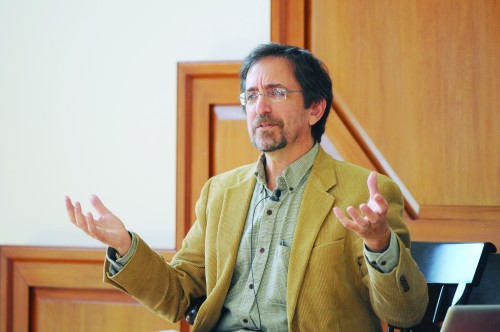 ANDREW REVKIN VISITED the Heffner Alumni House to discuss climate change and how knowledge can be spread to the general public or the “knowosphere” in hopes of changing the structure of debate on the topic.
ANDREW REVKIN VISITED the Heffner Alumni House to discuss climate change and how knowledge can be spread to the general public or the “knowosphere” in hopes of changing the structure of debate on the topic.Leading science journalist and popular New York Times blogger Andrew Revkin spoke and answered questions at the Heffner Alumni House last Thursday afternoon. Here is a brief description of his main talking points.
Speaking with a clear and cool sentiment, Revkin takes on the style of a cosmopolitan New Yorker. He seems to be wary about something; however, it is not the temperature of a sausage link he just purchased at the corner of 8th and 42nd streets, but rather of environmental sustainability.
It is clear to Revkin that the time we live in is a pivotal period in human history, for we are growing in “numbers as well as in appetites.”
The last time the Earth’s atmospheric composition was significantly changed, it was done “unknowingly” by cyanobacteria during the Great Oxygenation Event. Now, we face a point in time where humans are not only changing the composition of the atmosphere at an extremely fast rate, but are aware of doing so.
If we are smart enough to realize there is a change, what causes us not to take action on it?
Revkin believes this is caused by misleading reports and bad structure in debates on the environmental crisis. As a solution, Revkin appeals to the “knowosphere”—the body of knowledge that encompasses all human information on the planet. Although we have the right tools to disseminate this great body of information with the prevalence of the internet, nuances of the information can get lost in passing from one person to another—an often difficult task found in scientific journalism, filled with its jargon. Nonetheless, Revkin believes this “knowosphere” has the potential to greatly assist in solving the problems with transferring scientific information when used correctly.
Nowadays, heated debates over global warming are often argued under the wrong assumptions, Revkin reports. There are certain degrees of ”knowns” and “unknowns” in the realm of environmental debate, and the media weighs too often on the unknowns, which results in confusion for the public. For example, we know with more certainty the statement, “an atmosphere with higher carbon dioxide concentrations would rise in temperature,” over the statement, “human activity is the cause of increasing atmospheric temperatures.” Therefore, in order to alleviate the perceived struggles in debating on reasonable climate change initiatives, we must correct the architecture of the debate—i.e. what are we assuming.
Revkin’s experience and renowned name in journalism, such as his 20 years as a writer for the New York Times, certainly leaves him to be one of the best fit to answer this question.
Revkin feels that academia can provide a great service to the community by annotating and analyzing official documents, as well as by gauging the feasibility of sustainability reports, and by making such analysis available to the general public—or “adding to the knowosphere.” Furthermore, the dissemination of good engineering practices can lead to sustainable development and saved lives.
Some tools Revkin has found particularly helpful in adding to the knowosphere are blogs, twitter, and documentaries—which Revkin implements in classes he teaches at Pace University.
Disseminating information and subsequently addressing the problem of climate change and environmental crisis is a function of motivation, awareness, and communication, Revkin says.
Revkin is undoubtedly a distinguished and scrupulous writer, as well as a commendable individual. For better descriptions of some of his work and vision, see it for yourself at http://www.dotearth.blogs.nytimes.com.
After his lecture and Q&A session on Thursday, the Poly crew had a chance to ask him a few questions:
The Poly: You began as a biology undergraduate at Brown University, then went to graduate school for journalism at Columbia University. What made you change your career?
Revkin: I had no intention of being a writer. But I got a[n Arnold] fellowship [from Brown] to travel overseas, and saw terrible poverty. I came back wanting to do National Geographic, and realized I needed to learn more first. So I went to study journalism.
There were other aspects to [becoming interested in sustainability]. In Djibouti, I went ashore and saw leopard skins for sale by the boat; dozens of them, just piled up. That’s not sustainable. And at the Red Sea, on the windward side, there was a beach covered with lightbulbs. They just accumulated, and as the tide came in, more just washed up. It was a place with no people. That said a lot about how environmental problems pile up.
TP: Do you have any advice for current students?
AR: If you don’t end up studying in multiple disciplines, learn to collaborate on projects. Use other people’s skills. To not have the capacity to do that when you leave RPI can be a problem. For example, know when an animation of data would be more informative than a static image.
TP: Finally, if you were a fruit, what kind would you be and why?
AR: A fruit? I have mangoes on the brain because a student of mine just blogged about the mango. But I do want my ideas to be consumed by people. So maybe a kidney mango; the small yellow ones are best to savor and to share.
